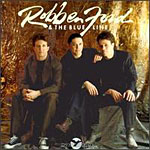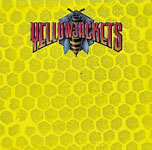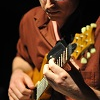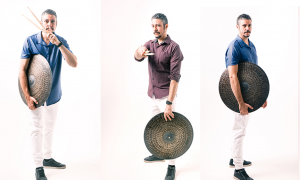Home » Jazz Articles » Interview » Robben Ford: From the Soul
Robben Ford: From the Soul

Recorded live over two nights at the Independent in San Francisco, alongside two studio tracks, Soul on Ten is a collection of classic covers, new versions of some of Ford's older tunes and new songs from Ford's ever expanding catalogue of original material. Featuring some of the finest musicians in the business, including organist Neal Evans of the funk band Soulive, bassist Travis Carlton (son of famed guitarist Larry Carlton) and drummer extraordinaire Toss Panos, Ford has brought together an ensemble that reflects his own diversity, allowing him to take his music into new and interesting realms of expression.
Ford's playing on Soul on Ten is indicative of the highly melodic, blues-based jazz-fusion sound that has made him a guitar hero to several generations of players. Never one to rely too much on his chops, as impressive as they can be, Ford is a player of distinguished melodic tastes. He prefers to develop an emotional connection with the audience through his lyrics and solos, rather than making an effort to impress with his playing alone. His ability to dig deep into his soul and put every word and note into an emotional context makes his lightening-fast runs that much more impressive when he does choose to bring forth the more virtuosic side of his playing. This elevates his music to a level that can only be reached by decades of dedication, performing, and connecting with his audience on both musical and emotional levels.
Soul on Ten is not only a window into Ford's career to this point; it is a foreshadowing of his future musical endeavors. Focusing on combing his guitar work with his relatively newfound love of singing and songwriting, Ford still has new trails to blaze. He gives the impression that despite the vastness and success of his musical output thus far, the best may be yet to come.
All About Jazz: Your new record Soul on Ten contains eight live tracks, as well as two studio tracks, that were recorded at the Independent in San Francisco. Had you planned on releasing those tracks before or after the concert?
Robben Ford: I had intended to record that concert and release tracks from those shows on my new album.
AAJ: Why did you decide to focus on the live aspect of your playing for your new album?
RF: I finally had a band that I felt really excited about presenting. There's such consistency with this trio that it was an opportunity to capture something that I knew that I was going to like. I felt that I was going to like it, and sure enough I did.
AAJ: Two of the tracks on the album, "Earthquake" and "Thoughtless," deal with the subject of being away from home and on the road all the time. How autobiographical are the lyrics for these two songs? RF: That's exactly what those songs are, definitely autobiographical in nature. "Earthquake" was actually written a couple of years ago, but it just didn't fit into anything at the time. I had written that for Truth (Concord, 2007), but it just didn't quite fit for that project. So I decided to wait and see what happened.
RF: That's exactly what those songs are, definitely autobiographical in nature. "Earthquake" was actually written a couple of years ago, but it just didn't fit into anything at the time. I had written that for Truth (Concord, 2007), but it just didn't quite fit for that project. So I decided to wait and see what happened.
"Thoughtless" is something I wrote very recently. The initial idea actually came from the desire to write something in 3/4 time. It's a little unusual to hear something in 3/4 time these days, unless it's some kind of blues triplet feel. That song actually started from the point of view of the music, from the feel and groove, which is the case sometimes. I'll get a musical idea first or a lyrical idea first, it could be either. On that opening verse, the first four lines came very quickly and naturally. So I never know where these things come from, really. From there on, it became a song that I was working on. Lyrics are tough, they're really hard.
I'm proud of the lyrics on all these new songs "Thoughtless," "Earthquake" and "Don't Worry About Me." They're all very unusual and unique and there was a lot of freedom exercised in the writing of those songs. I can get heady about things, over think things sometimes and I just didn't allow myself to do that too much with these songs. I spent a lot of time on them, but it was more a matter of just letting go and then things would come.
AAJ: When you first started your musical career, you were known for being an instrumentalist, but lately you've shifted gears a bit and added singing and songwriting to your vernacular. Had you always wanted to focus on these aspects of your music, or did the singing and songwriting happen naturally as your career developed? RF: Well, I started writing lyrics about fifteen years ago—that's when I really started to get serious about it. It's always been important for me to play my own music, and when I was younger, and an instrumentalist, I was writing instrumental music. It came out of a desire to first, make vocal music, and second, to make original music. I kind of started from scratch with songwriting, particularly from a lyrical point of view.
RF: Well, I started writing lyrics about fifteen years ago—that's when I really started to get serious about it. It's always been important for me to play my own music, and when I was younger, and an instrumentalist, I was writing instrumental music. It came out of a desire to first, make vocal music, and second, to make original music. I kind of started from scratch with songwriting, particularly from a lyrical point of view.
I saw an interview with the author of a book called the Tipping Point, where he talks about having to spend ten thousand hours to properly master something, and in the interview he said that those hours worked out to about ten years of focused work for most people. So, you know, about ten years in, I found myself writing some pretty good songs [laughs].
I have a lot more confidence in that area now, and I'm not afraid to get together with people who are better known, more famous, songwriters than I am. I feel like I can hang now. I recently co-wrote a song with Brad Paisley for his new CD ["Oh Yeah, You're Gone," from American Saturday Night (Arista, 2009)], which was the first time that someone of his fame and notoriety covered one of my songs. I'm really happy and excited about that.
AAJ: Is this something that you want to do more of in the future, write songs for other artists to sing and perform?
RF: Yeah, I'm definitely [into] doing that. I've made some very nice relationships in Nashville and have spent some real time there over the last couple of years. It's great, I really enjoy it.
AAJ: Apart from your originals there are a number of covers on Soul on Ten, including the famous blues tune "Spoonful." Out of all the blues tunes out there of this caliber what was it about "Spoonful" that spoke to you and made you feel that you wanted to include it on your new album?
RF: The first thing was finding an arrangement of that song that I liked, that felt good and that felt natural to me. Then, I could actually present that song. That's the big challenge when presenting a tune like that, that has been done in the past, specifically by Howlin' Wolf and later by Eric Clapton with Cream. But, I've got a lot of nerve. I'll step out on a limb when the tune is right and I'm comfortable with it. I also needed a band that could pull it off because there are very, very few musicians out there who can really play the blues, especially drummers and bass players.
AAJ: Had you planned on adding this tune to your repertoire before you got the band together? Or did it come to mind once you started jamming together and you felt the overall vibe of the group?
RF: I've never really thought about recording it and I wouldn't have, except in a live context like this. That's where it made sense and that's another reason why I went ahead and did it.
 AAJ: On two of the album's tracks, "Supernatural" and "There'll Never be Another You," you use your wah wah pedal to great effect. It seems like the wah is something that has fallen out of favor with guitarists these days, after being so popular in the '60s, '70s and even up to the end of the '80s. What is it about the wah that keeps it in your inventory of effects pedals?
AAJ: On two of the album's tracks, "Supernatural" and "There'll Never be Another You," you use your wah wah pedal to great effect. It seems like the wah is something that has fallen out of favor with guitarists these days, after being so popular in the '60s, '70s and even up to the end of the '80s. What is it about the wah that keeps it in your inventory of effects pedals?
RF: I've used a wah for years. In fact, I started using it before a lot of other people did. It's a very natural thing for the guitar—the Wah-Wah and guitar go together well—and it's just a very natural fit. I first started using it back when I played with Joni Mitchell, which was when I started using pedals. I wasn't naturally drawn to it because I listen to a lot of tenor saxophone players and guys like Miles Davis. I'm really a jazz fan at heart.
At that time I was playing more like a saxophonist, before I joined that band, the L.A. Express. Within that context, I started using pedals for the first time. Then I moved away from them for awhile. I've always kept the volume pedal around and there's a fuzz station in my amp so I don't need a pedal for that. I'm not sure when I came back to the wah, but it's just always felt like a natural extension of the guitar for me.
AAJ: Speaking of saxophone players, you yourself started playing music as a saxophonist. Recently, guitarist Sonny Landreth spoke about the effect that learning trumpet had on his guitar playing, especially in regards to phrasing, and he mentioned you as someone who he felt had a unique approach to phrasing because of your sax background. Can you comment on how your background with the saxophone has influenced your guitar playing?
RF: I don't think that it's necessary to have played the saxophone to have it effect someone's playing. You're going to sound like the people you listen to. That's just a fact. So if you're listening to some guitarist that you really like and admire, you'll begin to sound like them. If you're listening to John Coltrane and Wayne Shorter and Miles Davis, you're going to sound different. That alone is a big help. Just listening to those guys can help give you a unique sound and approach to phrasing on your instrument. AAJ: Going back to your gear a little bit, what guitars did you use to record the new album?
AAJ: Going back to your gear a little bit, what guitars did you use to record the new album?
RF: I used my Gold Top 57 Les Paul, which was loaned to me by Larry Carlton. I'm also playing, on the blues tunes, a 1960 Tele which I've had for many years. I also use a guitar called The New Paul by Sakashta. That guitar is featured all over my website and you can see me playing it on the cover of the Truth CD. Those are the three guitars that I use on the record, and they're kind of equally distributed over the album.
AAJ: Speaking of Larry Carlton, whom you've played with before and are going back out on the road with this fall [2009], his son Travis is playing bass on your new album. Do you notice any similarities between their playing, or does the fact that they play different instruments negate any comparison?
RF: No, there's really no comparison. They play such different instruments and their roles are so different that you can't really compare them. Travis is only twenty-six years old and he's very sophisticated for his age. Having grown up with Larry Carlton as a father is going to be a big help. He grew up around some of the best musicians in California, which means some of the best musicians in the world. So he's had quite the pedigree, musically speaking.
AAJ: You used two different organists on Soul on Ten: Larry Goldings and Neal Evans. What is it about these two organists that made you decide to use them on your latest record?
RF: They're both just great players, and Neal is someone I've known for years. Soulive, when they were first starting out, opened for me on the road, so I've known them since they were a "baby" band. I just love their playing, their group is so full of life, and I just really like them. When I had the opportunity to put this band together, I thought it would be a good chance to work with Neal and it's worked out great. He's a gas, just a great attitude and a lot of fun to be around, besides being a great player.
Larry Goldings is one of my favorite players out there today. When I want B3 on a record, he's the first guy I think of. When I go out on the road he's just too busy with his other commitments to join us, so when I could get him in the studio, I took the opportunity.
AAJ: You have an upcoming project with Gary Novak, Mike Landau and Jimmy Haslip. Can you give us an idea of what that project's going to entail?
RF: It's kind of a spin off of a studio band that Jimmy Haslip , Vinnie Colaiuta and I had called Jing Chi. Jing Chi made a couple of studio records and we performed only twice live, from which we recorded a live album. When the record company called and asked if we'd do another record, Vinnie wasn't available, so we decided to do something else and we'll give it a new name to go along with the new line up. This group will be a bit more rock than my thing and more instrumental than what my thing has been lately, but it's going to be a lot of fun and I'm really looking forward to it.
Selected Discography
Robben Ford, Soul on Ten (Concord, 2009)
Robben Ford, Truth (Concord, 2007)
Jing Chi, Jing Chi (Tone Center, 2002)
Robben Ford, Tiger Walk (Blue Thumb, 1997)
Joe Diorio and Robben Ford, Minor Elegance (MGI Records, 1990)
Robben Ford, Talk to Your Daughter (Warner Brothers, 1988)
Yellowjackets, Yellowjackets (Warner Brothers, 1981)
Little Feat, Down on the Farm (Warner Brothers, 1979)
Robben Ford, The Inside Story (Elektra, 1979)
Joni Mitchell, Hissing of Summer Lawns (Asylum, 1975)
Joni Mitchell and the L.A. Express, Miles of Aisles (Asylum, 1974)
Photo Credits
Page 1, Paolo Soriani
Page 3, George Wells, courtesy of Robben Ford
Tags
PREVIOUS / NEXT
Robben Ford Concerts
Support All About Jazz
 All About Jazz has been a pillar of jazz since 1995, championing it as an art form and, more importantly, supporting the musicians who make it. Our enduring commitment has made "AAJ" one of the most culturally important websites of its kind, read by hundreds of thousands of fans, musicians and industry figures every month.
All About Jazz has been a pillar of jazz since 1995, championing it as an art form and, more importantly, supporting the musicians who make it. Our enduring commitment has made "AAJ" one of the most culturally important websites of its kind, read by hundreds of thousands of fans, musicians and industry figures every month.






















